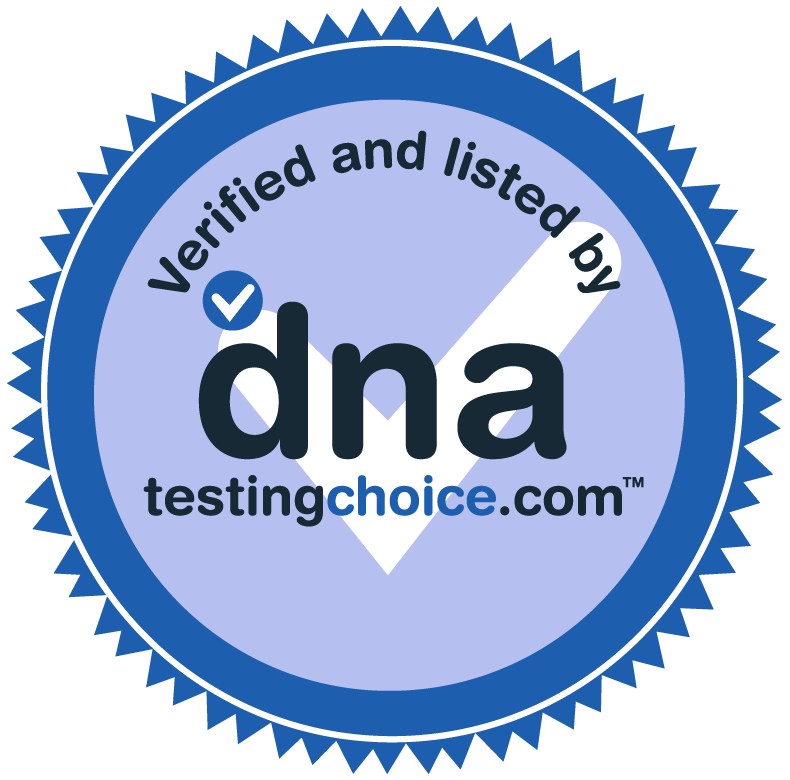Non-Invasive Prenatal Paternity Test
Price: €1095 (+ fee for the medical blood draw)
Testing: Expectant mother and alleged father samples
Timeframe: 5 to 7 working days from the moment samples reach the laboratory

International Biosciences offers this cutting-edge and 100% safe paternity test during pregnancy for only €1095. There is no need for any OBYGNs or complicated extraction procedures such as amniocentesis. Your results will be issued in only 5 to 7 working days (from receipt of samples at the laboratory) and are 99.9% accurate!
We also offer an express testing option with results in 3 to 4 working days guaranteed (please note that the mother needs to be at least 10 weeks pregnant). The additional cost for express testing is €265!
Prenatal Paternity Testing Options
The main advantages of our prenatal test are that it is unparalleled in its levels of accuracy and that it poses no risk to the developing foetus or the mother. Being the most advanced prenatal paternity test there is, this test is a better alternative to traditional methods in many ways; the following table compares and contrasts this test with more traditional medical procedures for extraction of fetal DNA.
| Invasive Testing (amniocentesis/ chorionic villus sampling) | Non-Invasive Testing | |
|---|---|---|
| When can the test be carried out? | Amniocentesis can be carried out at around 15 weeks and chorionic biopsies (CVS) carried out anywhere between 10-12 weeks. | Can be done at 7 weeks from conception (this means you will be in your 9th week of pregnancy, starting from the first day of your last menstrual period). |
| Sample collection | Samples for invasive prenatal tests can only be collected by an obstetrician/ gynaecologist using a local anaesthetic. | Samples can be collected by any trained professional. No need for any anaesthetic. Blood sample (more than 7 ml in volume) only required for the mother. Father’s sample is cheek cells which are collected via mouth swabs. |
| Difference in cost | Costs for invasive tests can be pretty high as you will incur charges for the extraction by the OBGYN as well as for the lab analysis. | Our test works out cheaper as the fee for the blood draw is far less; amniocentesis and CVS are costly. |
| Accuracy levels | The accuracy of paternity testing using invasive sampling methods is 98 to 99%. | Our test is consistently 99.9% accurate. |
| Risks and side effects | Invasive tests have many unpleasant side effects such as soreness, fevers and serious complications like loss of amniotic fluid. There is also a small risk of miscarriage. | No side effects and 0% risk of miscarriage. |
Discover the gender of your baby
Will it be a boy or girl? As an additional option for our paternity test during pregnancy, International Biosciences can also establish the gender of your baby using the same maternal blood sample we use for your non-invasive prenatal paternity test. The baby gender and prenatal paternity test in a single test can be selected by adding an additional €155 to the cost of the test.
Understanding the Science Behind the Test
The mother’s blood contains varying amounts of the DNA from the baby she is carrying. The volumes will vary depending on how many weeks of pregnancy have gone by. Our test is feasible starting at the 9th week following your last menstrual period. Once the blood sample is delivered to the laboratory the genomic analysis of fetal nucleic acids in the maternal blood can take place. For this test, we proceed to extract 2,688 sequences of DNA which we technically call Single Nucleotide Polymorphisms (SNPs).
The prenatal paternity test cannot be performed in cases of In Vitro Fertilization (IVF), twin or multiple pregnancies, less than 9 weeks pregnancy (7 weeks past conception) or when the alleged fathers are close blood relatives. This test also cannot be performed when the mother is suffering from cancer or pre-eclampsia or has had a recent blood transfusion, bone marrow, organ transplant or stem cell therapy.
Sample Collection
We have created a kit specifically for this test. All clients doing a prenatal paternity test must use our sample collection kit which will be sent out to them once payment has been made. The kit contains 2 vacutainer blood collection tubes for the mother’s blood sample and mouth swabs for the alleged father. Instructions and forms are also provided inside the kit. A trained professional such as a phlebotomist or nurse will need to fill in a section of these forms whilst another section will need to be filled in by the mother and the alleged father.
Importantly this kit is specially designed and suitable for postage of blood samples. We also include a pre-paid courier service for you to send back your samples to us. Please organise to have the samples collected on the same day of collection and within a short period of time as the samples need to return to the laboratory within 5 days.
Note: The volume of fetal DNA in the mother’s blood will normally increase as pregnancy weeks progress. This test requires a minimum volume of fetal DNA in the samples provided to be able to extract enough foetal genetic markers. Every pregnancy is however different; the vast bulk of our tests are successful but in some rare cases, we do not find sufficient foetal DNA in the sample provided. In this case, we will require a re-draw. The client will not incur any additional cost for the second analysis other than a service charge to cover the cost of the new kit and shipping fee.
Read more about the sample collection for our test. You can also use our pregnancy calculator to work out your dates!
What other Prenatal Tests do you provide?
International Biosciences offers non-invasive prenatal testing for chromosomal abnormalities. The test will provide an indication as to whether the expectant mother is at an increased risk of carrying a child with a chromosomal abnormality or not. Get more information about our non-invasive prenatal test for Down Syndrome!
FAQs
How soon should I send the samples once collected?
We recommend sending the samples over as soon as possible after collection to minimise the delay in reaching the laboratory and potential degrading of the sample.
Can the shipment of blood cause issues?
The packaging and boxing we provide for our kit is purposely designed and includes all the required documents for shipping. You should encounter no problems sending your samples back to the laboratory.
Can previous pregnancies or miscarriages affect my test results?
Previous pregnancies or miscarriages cannot affect your test results since fetal DNA disappears from the maternal bloodstream within a period of a few hours. However, the test results can be affected by other factors such as the gestational period, mutations in the person’s DNA, contamination during sample collection, sample storage and transportation.
Can I send in additional samples after the results have been issued?
Once results are issued, the case will be closed. The company is unable to use results from a previous prenatal test for additional testing once results are issued. If the client requires additional testing after results have been issued (for example, testing a second alleged father), we will need fresh samples from the mother and the father. In such cases, the client will need to purchase a new prenatal test at the price stipulated on the website.




